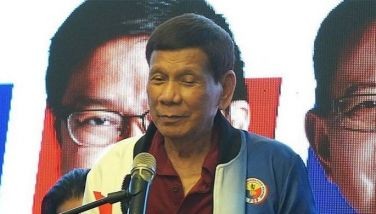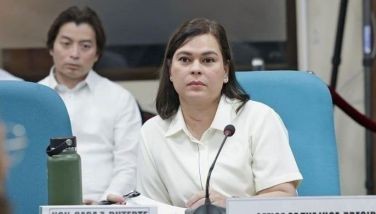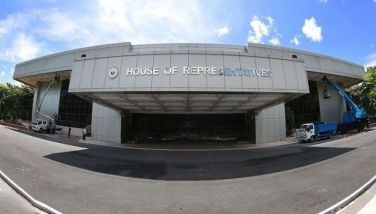Bishop: Go ahead, tax Church
September 4, 2004 | 12:00am
Archbishop of Manila Gaudencio Cardinal Rosales dared the government yesterday to tax the Catholic Church.
Speaking at the anniversary celebration of Metrobank in Makati City, Rosales said the Church is "not that greedy" to evade its obligations if indeed the government has something to tax.
"If there is anything taxable in the Church, then tax the Church," he said.
However, Rosales said if the Catholic Church were to be taxed, the government should tax all other religious groups, along with their schools and other properties.
Meanwhile, Justice Secretary Raul Gonzalez said yesterday activities and properties of religious groups not used for religious purposes should be taxed to help the government raise much-needed funds.
Some religious groups might have been set up for business purposes, he added.
Gonzalez said the government should look into the business of religious groups managing schools, and television and radio networks.
If the business of the religious group is not religion-related, it must be taxed, he added.
However, Gonzalez said the matter must be clarified by the Supreme Court because it would touch on the issue of separation of Church and State.
When a religious group questions the Bureau of Internal Revenue why it is being taxed, then the Supreme Court can step into the picture, he added.
On the other hand, Rosales said it would be absurd to tax religious ceremonies on baptism, marriage, and death.
"How would you tax baptism, marriage, final rites," he asked. "Sure, it has to be taxed if (for) business ventures."
Rosales said the government could use the European model of taxing the Church, and in doing so tax the public for practicing a religion.
Under that system, the government would pay the salary and other needs of religious institutions from money collected from the faithful, he added.
However, Rosales said the proposal would not prosper in the country.
"With the narrow-mindedness of some of our leaders, everytime they see Church, (they exclaim) separation of Church and State, ‘oh (the) Church a horrible thing, it is a monster,’" he said.
"Will that work in that kind of mentality?"
Meanwhile, a lawmaker belonging to El Shaddai, a Catholic charismatic movement, branded yesterday as "unconstitutional" a plan to tax churches and religious organizations.
Buhay party-list Rep. Rene Velarde said if the plan pushes through, it would violate the principle of separation of Church and State as enshrined in the Constitution.
"(Under Article VI, Section 28), charitable institutions, churches and parsonages or convents... in all lands, buildings and improvements, actually, directly, and exclusively used for religious... purposes shall be exempt from taxation," he said.
However, Velarde, a son of El Shaddai spiritual leader Bro. Mike Velarde, said "members of the varied churches in the Philippines" must pay taxes — their obligations as citizens of the Philippines.
"The duty of tax paying as against tax evading should be dutifully performed by every citizen of our country in the same way as we expect our government to do its share in effective tax collection," he said.
On the other hand, another congressman, who is a Baptist pastor, asked the Catholic Church and other churches to declare income-generating ventures and pay the corresponding taxes for their schools, hospitals, and other businesses.
"Let the churches be the example of generosity," Manila Rep. Bienvenido Abante Jr. told reporters at the weekly Balitaan sa Hotel Rembrandt forum in Quezon City.
Pampanga Rep. Rey Aquino and former House minority leader Carlos Padilla, who were also at the forum, agreed with Abante that churches should pay taxes or shell out contributions to the fund-raising campaign of the national government.
Padilla urged the Bureau of Internal Revenue and local governments to make an inventory of religious business ventures and collect the necessary taxes.
He said the Constitution only exempts from taxation real properties and non-profit ventures being undertaken by religious groups and non-stock, non-profit organizations.
"What we need is a strong will from the national and local government to impose the law," he said.
Abante, leader of the 30,000-strong Alliance of Baptist Churches, said the Constitution exempts real properties and religious activities from taxes, not businesses and other income-generating ventures.
He said he would file a resolution in the House of Representatives calling for a full inventory of taxable properties of various religious groups, along with their income.
Church leaders must take the initiative in generating much needed revenue for the country, Abante added. — With reports from Cecille Suerte Felipe, Paolo Romero, Perseus Echeminada
Speaking at the anniversary celebration of Metrobank in Makati City, Rosales said the Church is "not that greedy" to evade its obligations if indeed the government has something to tax.
"If there is anything taxable in the Church, then tax the Church," he said.
However, Rosales said if the Catholic Church were to be taxed, the government should tax all other religious groups, along with their schools and other properties.
Meanwhile, Justice Secretary Raul Gonzalez said yesterday activities and properties of religious groups not used for religious purposes should be taxed to help the government raise much-needed funds.
Some religious groups might have been set up for business purposes, he added.
Gonzalez said the government should look into the business of religious groups managing schools, and television and radio networks.
If the business of the religious group is not religion-related, it must be taxed, he added.
However, Gonzalez said the matter must be clarified by the Supreme Court because it would touch on the issue of separation of Church and State.
When a religious group questions the Bureau of Internal Revenue why it is being taxed, then the Supreme Court can step into the picture, he added.
On the other hand, Rosales said it would be absurd to tax religious ceremonies on baptism, marriage, and death.
"How would you tax baptism, marriage, final rites," he asked. "Sure, it has to be taxed if (for) business ventures."
Rosales said the government could use the European model of taxing the Church, and in doing so tax the public for practicing a religion.
Under that system, the government would pay the salary and other needs of religious institutions from money collected from the faithful, he added.
However, Rosales said the proposal would not prosper in the country.
"With the narrow-mindedness of some of our leaders, everytime they see Church, (they exclaim) separation of Church and State, ‘oh (the) Church a horrible thing, it is a monster,’" he said.
"Will that work in that kind of mentality?"
Meanwhile, a lawmaker belonging to El Shaddai, a Catholic charismatic movement, branded yesterday as "unconstitutional" a plan to tax churches and religious organizations.
Buhay party-list Rep. Rene Velarde said if the plan pushes through, it would violate the principle of separation of Church and State as enshrined in the Constitution.
"(Under Article VI, Section 28), charitable institutions, churches and parsonages or convents... in all lands, buildings and improvements, actually, directly, and exclusively used for religious... purposes shall be exempt from taxation," he said.
However, Velarde, a son of El Shaddai spiritual leader Bro. Mike Velarde, said "members of the varied churches in the Philippines" must pay taxes — their obligations as citizens of the Philippines.
"The duty of tax paying as against tax evading should be dutifully performed by every citizen of our country in the same way as we expect our government to do its share in effective tax collection," he said.
On the other hand, another congressman, who is a Baptist pastor, asked the Catholic Church and other churches to declare income-generating ventures and pay the corresponding taxes for their schools, hospitals, and other businesses.
"Let the churches be the example of generosity," Manila Rep. Bienvenido Abante Jr. told reporters at the weekly Balitaan sa Hotel Rembrandt forum in Quezon City.
Pampanga Rep. Rey Aquino and former House minority leader Carlos Padilla, who were also at the forum, agreed with Abante that churches should pay taxes or shell out contributions to the fund-raising campaign of the national government.
Padilla urged the Bureau of Internal Revenue and local governments to make an inventory of religious business ventures and collect the necessary taxes.
He said the Constitution only exempts from taxation real properties and non-profit ventures being undertaken by religious groups and non-stock, non-profit organizations.
"What we need is a strong will from the national and local government to impose the law," he said.
Abante, leader of the 30,000-strong Alliance of Baptist Churches, said the Constitution exempts real properties and religious activities from taxes, not businesses and other income-generating ventures.
He said he would file a resolution in the House of Representatives calling for a full inventory of taxable properties of various religious groups, along with their income.
Church leaders must take the initiative in generating much needed revenue for the country, Abante added. — With reports from Cecille Suerte Felipe, Paolo Romero, Perseus Echeminada
BrandSpace Articles
<
>
- Latest
- Trending
Trending
Latest
Trending
Latest
Recommended




























